Analyzing facial skin at home with high accuracy was only a dream until few years back. But now, thanks to the advancements in computer vision and AI technologies, facial skin analyzers have become a reality. These new high-tech devices use computer algorithms to deeply analyze skin issues and provide personalized skin care recommendations.
What is a Facial Skin Analyzer?
A facial skin analyzer is a specialized device that uses computer vision enabled by AI to analyze skin conditions and facial features. These devices usually come with a small camera integrated that captures images of the user’s face from different angles. The captured images are then analyzed using deep learning algorithms trained on thousands of facial images to detect various skin issues like acne, pigmentation, signs of aging, sun damage, etc. Within seconds, these devices generate a detailed skin analysis report highlighting any issues detected along with their severity levels and locations on the face. They also provide customized skin care recommendations and product suggestions based on the analysis.
How does it Work?
Facial Skin Analyzers employ advanced computer vision and deep learning techniques to deeply analyze skin:
– The user takes pictures of their face using the in-built high resolution camera from different angles as instructed.
– The images are processed using Convolutional Neural Networks (CNN) trained on a vast database of facial images with various skin conditions labeled for training.
– The CNN model detects features like texture, color, spots, lines, pores, bumps on thousands of critical points on the facial skin.
– It analyzes these features to identify any skin issues, their locations and severity levels.
– Based on the analysis, it generates a detailed report highlighting the key findings along with customized recommendations.
Key Features Analyzed:
– Skin Tone: It detects the overall skin tone – fair, medium or dark. This helps in product matching.
– Pigmentation: It identifies areas of excess pigmentation like dark spots, melasma, sun spots etc.
– Wrinkles/Fine Lines: It detects signs of chronological and photo aging like expression lines, crow’s feet etc.
– Pores: It analyzes pore size, visibility and congestion levels across the T-zone and cheeks.
– Blemishes: It spots pimples, white/black heads and severity of acne prone skin.
– Circulation: It checks redness, broken capillaries and blood circulation issues.
– Elasticity: It estimates skin firmness, sagging and loss of elasticity levels.
Benefits of Using a Facial Skin Analyzer
– Precision tracking: It provides an objective analysis of skin issues and progress compared to subjective self-assessment.
– At-home convenience: Users can analyze their skin anytime from the comfort of their home without visiting a dermatologist.
– Personalization: The analysis and recommendations are tailored to an individual’s exact skin type, issues and goals.
– Saves money: Unlike costly dermatology visits, these devices are affordable for regular personalized skincare.
– Documentation: The reports generated acts as skin health records over time to track improvements from treatments.
– Empowers users: It educates users about their own skin and optimal products to tackle specific conditions.
– Motivates consistency: Regular use enhances skincare compliance for faster results.
Limitations and Considerations:
While facial skin analyzers offer convenience, their analysis cannot replace actual dermatological evaluations. Some limitations to keep in mind include:
– Diagnostic limitations: They lack capabilities to diagnose serious medical conditions like melanoma that require biopsy.
– Over-reliance risk: Users should not become overly dependent and ignore seeing a dermatologist if needed.
– Limited database: The available training databases may not cover all ethnic skin types and rare conditions accurately.
– Environmental factors: Analysis can vary based on lighting conditions, makeup, facial hair, etc during image capture.
– Software updates: Frequent software and database upgrades are required for improved accuracy over time.
Future Scope:
As the underlying computer vision and AI algorithms continue to evolve at a rapid pace, facial skin analyzers are expected to become even more clinically accurate in the coming years. With larger and more diverse training datasets, they will be able to analyze a wider range of skin types and conditions. Integrating other modalities like thermal sensors may allow checking blood circulation, hydration levels as well. Overall, these smart devices have huge potential to transform personalized skincare routines and complement professional dermatological services for those seeking periodic and affordable skin analysis from the comfort of their homes.
*Note:
1. Source: Coherent Market Insights, Public sources, Desk research
2. We have leveraged AI tools to mine information and compile it


